Urban Homesteaders
Excerpts from an interview with Choi Chatterjee and Omer Sayeed on August 13, 2022
By Tona Rodriguez-Nikl
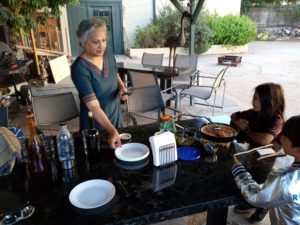
Choi Chatterjee and Omer Sayeed welcomed our family into their lovely urban homestead in the foothills of Los Angeles County. We shared a delicious, homemade meal: quiche, nopal (cactus) with tamarind, grape jam, pickled grapes, honey, grapefruit wine, and fig liqueur. Most of the ingredients, including the eggs, nopal, grapes, honey, grapefruit, and figs, were from their garden. After the meal my wife and I sat down to learn more about what they do, while our kids went off to explore and play with the animals.
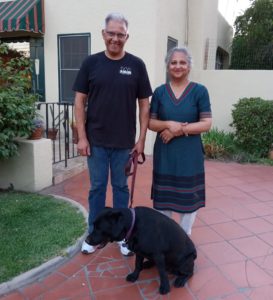
Their garden is teeming with vegetable and animal life. The vegetable garden includes indigenous foods such as chaya, amaranth, and tepary bean, which are suited to the arid climate. They also grow a variety of aromatic herbs for teas and spices. Much of the garden is available for neighbors to help themselves to the produce. Choi and Omer also have chickens, fish ponds, beehives, goats, and tortoises. They make a wide variety of products, including wines from excess fruit and honey, alcoholic bitters and fruit extractions, herbal teas, candles from the beeswax, smoked and aged meats, and pickled fruits.
All aspects of their homestead work together. The chickens, goats, and fish provide nutrients through their manure (the fish ponds are flushed monthly, providing fertile irrigation). The goats and tortoises maintain the lawns. The chickens do the hard work of turning the compost. Instead of resorting to chemical pesticides, the mix of plants is carefully thought out to provide natural biodefense; they use no pesticides at all. The bees drink from the fish ponds. Every aspect seems to be honed through thought and experience to work optimally. Even the fish ponds are just deep enough to dissuade the urban raccoons from entering.
Choi and Omer consistently expressed joy in discovering and learning as they go along. “There was no blueprint. I think that’s the fun part. We are constantly discovering things,” said Choi, “I never feel oh, I figured it out. I get something random every day.” Omer added, “Evolution is change by definition and we are living in a changing world. I’m not making a political statement, just your yard changes and the plant that you planted six years ago isn’t the same plant that you will have now.”
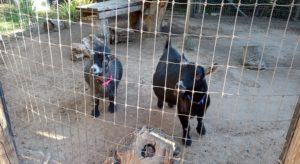
Choi and Omer seem to have a particular dislike for what others call “waste,” instead seeing its myriad beneficial uses. The chickens, Omer said, “Besides the eggs, are manure creating animals, which is major. The biggest reward is actually the manure.” The dirty water from the fish ponds, likewise, is food for plants. Pickling green grapes started in part to prevent the excess from spoiling and also drew on historical knowledge. “You do the historical research,” says Choi, “and you find they used to pickle grapes because they didn’t have lemons. Grapes were their sourness for food. So many of the things that we are doing is reinventing the wheel that someone’s forgotten about!” Even the water from washing rice or boiling lentils becomes nutrients for the compost.
Their homestead is perhaps even more about people than it is about the plants and animals. “It’s a reason to gather,” says Choi, “Why else are we put on this earth other than to just bring people together?” Over the years, as their daughters grew up (they’re now both adults), the homestead became a reason for family togetherness. “The kids loved it,” explains Choi, “They’d feed in the morning before they went to school… I think it made for a very calm morning if you have to take care of other people. It wasn’t just about them.” During their teenage years, the homestead became a gathering place for their daughters and their friends. “We really didn’t have any teenage issues,” explains Choi, “because mostly the kids will say, ‘oh, let’s go over and hang out at your house.’ I’d be happy to serve them food.” This sentiment continues to this day, explains Choi: “Even now my younger daughter [who happened to be visiting] and her dad were making candles from the beeswax from the hives. So, they still feel that sense of attachment.”
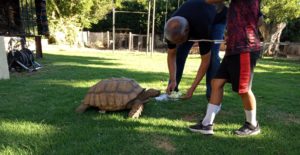
Neither Choi nor Omer believes that they are part of a movement or are tackling global problems. They keep their homestead because they like it, and it works for them. “It’s fun. I mean, really, it’s almost self-indulgence,” explains Omer, “I get up, I get up at six and I can’t wait to get out here. The first 45 minutes of my day is essentially with the animals and it’s just something new every day.” Choi recognizes that their way of life is a privilege, “I have a friend who says, ‘this is bourgeois pretense,’ and that’s true. If we didn’t do anything there would still be [the grocery store]. The water still comes from the tap. So just a little bit pretense, but it’s good pretense.”
Yet, they also care about community and making their little corner better. And with this comes a recognition that they aren’t going to make much headway unless they have taken care of themselves first. Choi references Hinduism, which says “‘First, save yourself. If you can’t even save yourself, how are you going to do any good for the world?’ It sounds a little selfish, but I realize if I’m not stable, then I’m just contributing to the instability.” Omer adds about the Indian tradition of knowing yourself, “before you go and preach you need to first figure yourself out. I think once I do that I’ll preach, but I haven’t. I just have fun while I’m busy I’m trying to figure myself out.”
Even for global issues such as climate change, their preference is to address it locally, giving life to the expression, “be the change you want to see in the world.” Choi says, “Let’s do something. Let’s not just talk about it. I guess I’m just so tired of talking about climate change, you know, we can do many things right now with our hands.” Omer, similarly, said that the thing to do is “each person first do what you can. We have one car, I ride a bicycle, and were composting [they also have solar panels]. We’re basically trying to minimize what we are consuming and producing. And then we can talk to others… I think the climate solution is people do it themselves.”
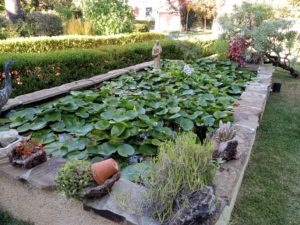
Both Choi and Omer pushed back against the term “degrowth,” drawing upon examples from India and Pakistan. For Choi, the label “degrowth” suggest that “capitalism is a terrible system, and we should stop with whatever we’re doing. But I feel that’s a little bit dangerous. So, people who live in modernity, want everyone else to live like peasants, right? Or billionaires have their private jets and the rest of us bicycle. I think there is an element of paternalism, in degrowth.” Choi added that many people in India are living the life of degrowth, but “they want piped water, they want electricity, they want access to the internet. So, I don’t know if it’s correct of me to tell them just keep being a peasant, while I enjoy modernity. And that’s how degrowth often comes across.” Omer adds, “we came to this country voluntarily because of the economic opportunities and benefitted. I mean, it is a land of opportunity. You come here with nothing, and the economy enables you to create something, just converting hard work into wealth. So, for me, if someone said, let’s go back to the way it was in Pakistan, yeah, it’s an option, but who would want to do that?” Choi summarizes the difficult tradeoffs of economic development, “In India, we’ve had this massive increase of the middle class in the last 20 years. And some aspects of it just appall me. The consumerism, the waste, the environmental impact. On the other hand, we see people who’ve never felt any self-worth and feel now this enormous sense [of self-worth]. And that’s the politics that’s ruling the world. The haves who just want nothing to change. And then the have-nots who want something, but are being told no. You go back to being a peasant.”
 Choi prefers the notion of a circular economy, in which every so-called waste product has a beneficial use. “I love this idea of self-regulating communities that can diversify food systems, people who produce our own food. And I think the circular economy is tied to that notion. It’s based on the community not generating waste, unlike the whole capitalist dynamic of production, consumption, and waste.” India, she says, “is one of these weird countries, which still has a classical civilization. So, some of the things people are still doing, they’ve been doing for thousands of years. And it’s very much a circular economy, let’s use every part of every plant that we can think of. I just said I’m using lavender buds right now let’s use the leaves, let’s use the twigs, let’s use the branches, let’s use the roots. It just makes sense to me. All of this is part of the circular economy. If it’s waste, we turn it into something else.” For Choi, the notion of a circular economy “takes away the question of degrowth for who?” And their homestead is the perfect setting to put that philosophy into action.
Choi prefers the notion of a circular economy, in which every so-called waste product has a beneficial use. “I love this idea of self-regulating communities that can diversify food systems, people who produce our own food. And I think the circular economy is tied to that notion. It’s based on the community not generating waste, unlike the whole capitalist dynamic of production, consumption, and waste.” India, she says, “is one of these weird countries, which still has a classical civilization. So, some of the things people are still doing, they’ve been doing for thousands of years. And it’s very much a circular economy, let’s use every part of every plant that we can think of. I just said I’m using lavender buds right now let’s use the leaves, let’s use the twigs, let’s use the branches, let’s use the roots. It just makes sense to me. All of this is part of the circular economy. If it’s waste, we turn it into something else.” For Choi, the notion of a circular economy “takes away the question of degrowth for who?” And their homestead is the perfect setting to put that philosophy into action.
For your consideration:
How can you do good in a way that also brings you joy? How would reduced consumption affect your life differently than the lives of people in countries at different stages of development?